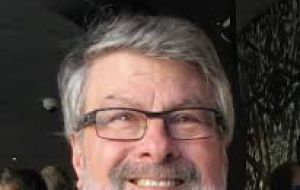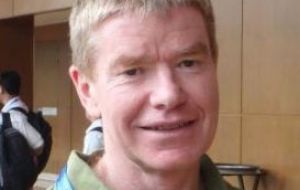MercoPress. South Atlantic News Agency
IAATO members vote to develop an Antarctic conservation plan
 “This was an important decision that reflects our members’ ongoing commitment to sustainable Antarctic tourism.” said Terry Shaller Chair of IAATO’s ExCo
“This was an important decision that reflects our members’ ongoing commitment to sustainable Antarctic tourism.” said Terry Shaller Chair of IAATO’s ExCo  “The partnership is an important step further towards the adoption of best-practice for the region” noted Steven Chown President of SCAR.
“The partnership is an important step further towards the adoption of best-practice for the region” noted Steven Chown President of SCAR. Members of the International Association of Antarctica Tour Operators (IAATO) have agreed to develop a science based conservation plan for the Antarctic Peninsula in collaboration with the Scientific Committee on Antarctic Research (SCAR) to support decision making for tourism management.
“This was an important decision that reflects our members’ ongoing commitment to sustainable Antarctic tourism.” said Terry Shaller from Ponant and Chair of IAATO’s Executive Committee. “It’s about combining our knowledge and resources with SCAR’s scientific expertise to develop an effective long-term management plan that will conserve the Antarctic environment while enabling sustainable use.”
“The partnership is an important step further towards the adoption of best-practice for the region” noted Steven Chown from Monash University and President of SCAR. “Joint work among stakeholders lies at the very foundation of good conservation planning.”
The agreement was made last week in Edinburgh, Scotland, at IAATO’s annual meeting from 2-4 May. Over 130 people attended representing member companies and invited experts from governments, environmental and scientific organizations and charitable trusts, all of whom have a vested interest in Antarctica’s future.
Other meeting highlights included:
Membership; Former Provisional Operator members, Plantours Kreuzfahrten GmbH and DAP were voted in as Operators. Noble Caledonia Ltd, Albatros Travel, Scenic Luxury Cruises & Tours, IceTrek Expeditions and Icebird Expeditions joined the ranks of IAATO as Provisional Operators. Salén Ship Management and YC Group Ltd were voted in as Associate members. IAATO currently has 122 members.
Executive Committee; Members voted to appoint Terry Shaller from Ponant as the new Chair of the Executive Committee. Bob Simpson (Abercrombie and Kent, USA) stepped down as Chair, but remains on the Committee with Prash Karnik (Seabourn Cruise Line Ltd.), Mark Van der Hulst (Oceanwide Expeditions) and Andrew Prossin (One Ocean Expeditions Inc.). Robyn Woodhead (White Desert Ltd) and Rob McCallum (EYOS Expeditions Ltd) were welcomed onto the Executive Committee for the first time. Marlynda Elstgeest (Waterproof Expeditions) and Skip Novak (Pelagic Expeditions) stepped down and were thanked for their contributions over the last 5 years.
Policy Review: Members voted to continue the ban on the recreational use of Unmanned Aerial Vehicles (UAVs) in the wildlife rich coastal areas of Antarctica. The ban will be reviewed annually to allow for potential technological advances and further developments within the regulatory community.
Guidelines: In anticipation of future developments and advancing technology, members adopted new guidelines for manned submersibles and remotely operated underwater vehicle activities. They complement IAATO’s current Underwater Activity Guidelines for activities such as diving and snorkeling.
Guidance: In recognition of the expanding population and range of fur seals across the Antarctic and sub-Antarctic, members approved information for operators that enhances understanding of fur seal behaviour and advises on minimizing disturbance to these animals.
Climate Change: Members tasked IAATO’s Climate Change Working Group with providing members with up-to-date information on the association’s carbon footprint.
Science Support: Members voiced their commitment to research projects and collaborations that advance global understanding of Antarctica. This includes citizen science, which is research requiring help from Antarctic visitors with data collection.




Top Comments
Disclaimer & comment rulesCommenting for this story is now closed.
If you have a Facebook account, become a fan and comment on our Facebook Page!